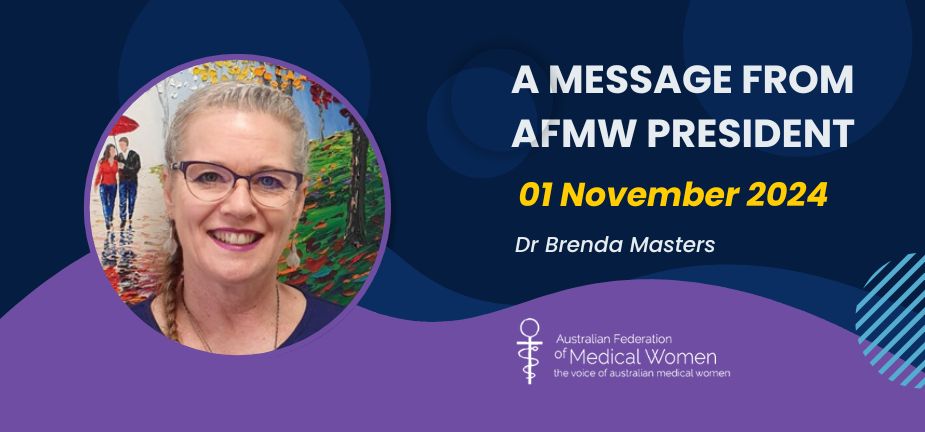We have had a bit of a turbulent time in AFMW of late, and I hope that we are now about to enter calmer waters and see our organisation return to its key purpose of supporting Medical Women.
Our organisation has been in existence for nearly a century, starting in 1927 as a national voice for Medical Women at a time when women were in the minority (almost a curiosity) as Students and Doctors. Last weekend I returned to Adelaide to attend a Reunion of my old class 40 years since graduation. I recall being one of a cohort of students among the earliest to have roughly equal representation of women, and I enjoyed a very supportive education – perhaps I was lucky, but I am very aware that some of my medical sisters have not had such a charmed career path.
The 21 Medical Schools in Australia are now graduating over 3.5k doctors each year, 53% of whom are female (Medical Schools outcomes database, National Data report 2024), and women now contribute around 40% of the work done by Doctors around our Nation.
It is distressing to still learn of obstacles and glass ceilings being placed in front of some women, and seeing women make hard decisions about lifestyle and family that their male colleagues do not face. I observe that the senior positions in medicine are disproportionately taken by men, and I see the same phenomenon in the Public Service in Canberra where many of my patients work. We can’t change our biology, but through supporting each other we can help to form new pathways to medical careers that don’t force us to choose between parenthood and fulfilling our potential. We are aware that our indigenous sisters have even greater obstacles to surmount in pursuing a career in medicine. We like to extend our support to non-binary doctors who also face gender-based discrimination. Such issues face women around the world and we are part of a global association of medical women, MWIA, to bring the voice of medical women to forums such as the United Nations.
I am saddened when I see successful women shore up their own position and close the door to their colleagues. It is equally disheartening when women are reported to be bullies and perpetrators of bad behaviour against each other. There are some wonderful role models out there, and we have some exceptional women in AFMW working to improve the lot of women and the health of women and children around the globe.
Over the next 2 years, as President of AFMW I undertake to work with the Council to represent the needs and concerns of Medical Women. We will continue to report back to you through the eBulletin, and welcome feedback either through your state representatives or directly to one of us. As volunteers, we need to be careful not to exhaust the precious resource of our own energy and we are always on the lookout for like-minded women who share a passion to become involved in issues that arise.
There are a few casual vacancies on council; in addition to the ones highlighted by Madhura, we would be delighted to see representation from young women (our definition = under 40), and we don’t currently have a representative from our Individual Members on Council (an individual member is one not affiliated with a State or Territory Association).
Do reach out if you have something to say or need some help – I can’t promise a solution but I can promise to care. Through growing our network we can become a strong force for change.
With gratitude to the women who paved the way for me,
Dr Brenda Masters
President, AFMW
Dr Brenda Masters is a Canberra GP, President of the AFMW (2024-2026).
Brenda grew up in rural SA, studied Medicine in Adelaide, and has worked in Practices around the country before settling in our beautiful National Capital over 20 years ago.
Brenda is keenly involved in the Medical Women’s Society of ACT and Region, a group who provide both networking and peer support. She believes that everyone should be given the opportunity to realise their full potential in life and applies this to both her work and her relationships.
Brenda enjoys gardening and singing in her spare time and tries to make the most of Canberra’s proximity to the snow.

